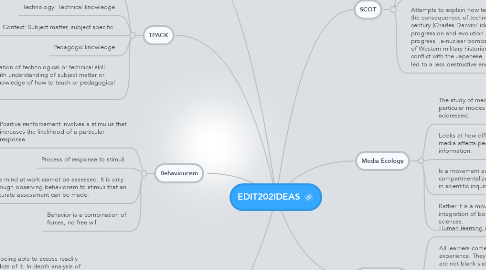EDIT202IDEAS
by Mykhailo Himka

1. Connectivism
1.1. Knowing more is being able to access readily information, and lots of it. In depth analysis of one source is less important.
1.2. Idea of currency or up-to date knowledge being easily available to learners,.
1.3. Learning is a process of connecting information from a variety of sources. A learner can improve their own understanding of content by accessing a variety of viewpoints and expert analysis.
1.4. The integration of cognition and emotions in understanding is important. Emotional thought and analytic thought are not divorced from each other when learning.
1.5. Nurturing and maintaining connections within the framework of learning i.e between different modes of thought or methods of thinking about knowledge is part of connectivist learning.
2. Behaviourism
2.1. Positive reinforcement involves a stimulus that increases the likelihood of a particular response.
2.2. Process of response to stimuli.
2.3. The mind at work cannot be assessed. It is only through observing behaviorism to stimuli that an accurate assessment can be made.
2.4. Behavior is a combination of forces, no free will.
3. TPACK
3.1. Technological Pedagogical and Content Knowledge
3.2. Technology: Technical knowledge
3.3. Context: Subject matter, subject specific.
3.4. Pedagogic knowledge
3.5. TPC= The combination of technological or technical skill with computers, with understanding of subject matter or context with the knowledge of how to teach or pedagogical aptitude.
4. Philosophy of technology
4.1. Is a personal philosophy of teaching and involves how the teacher incorporates technology into their pedagogical practice.
4.2. Linked to philosophy of teaching
5. SCOT
5.1. That technology responds to society.
5.2. That their are explanations as to why technology fails or succeeds and presupposes that an objective truth exists.
5.3. Attempts to explain how technology arises without taking historical, economic and political factors into consideration. SCOT ignores the consequences of technologies and their impacts positive, negative or neutral/somewhere in between, on society. It has a 19th century (Charles Darwin/ ideas of progress) approach to understanding using ideas (although calling it something else) such as progression and evolution and linking it to positive forces or change. Sadly one cannot attribute technological progress with societal progress i.e-nuclear bombs, nor is the creation of such a devise a response to societal change. Possibly in the extreme segments of Western military historians one can find an argument for the necessity of dropping bombs on Hiroshima and Nagasaki to end the conflict with the Japanese, but in Japan one would be hard pressed making such an argument, and many other events could have led to a less destructive end to the conflict. This is just one example of many I can think of.
6. Media Ecology
6.1. The study of media environments, in particular modes of information sharing are addressed.
6.2. Looks at how different technological media affects peoples perception of information.
6.3. Is a movement away from the rigidly compartmentalized, uncoordinated specialization in scientific inquiry
6.4. Rather it is a movement toward increasing integration of both the physical and the social sciences.
7. Constructivism
7.1. Human learning is constructed.
7.2. All learners come with knowledge and life experience. They do not exist in vacuum. They are not blank slates.
7.3. Learners assume responsibility for their own learning.
7.4. Learner's and teachers collaborating on work allows for multiple perspectives and understanding.


